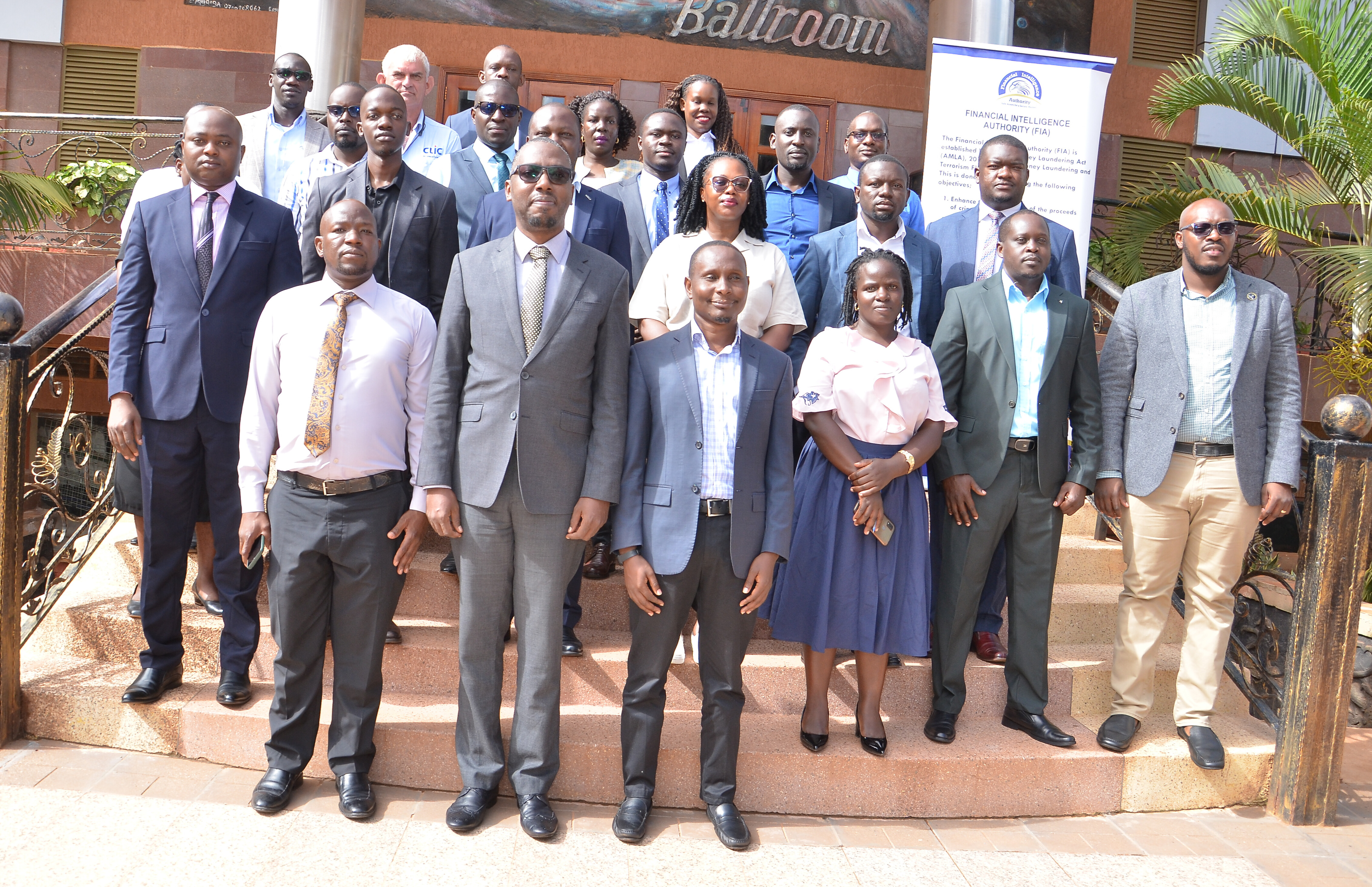FIA conducts training on the ML/TF risk assessment for VASPS
Members of the newly formed National Working Group on the Money Laundering (ML)/Terrorism Financing (TF)Risk Assessment for Virtual Assets(VA) and Virtual Assets Service Providers(VASPS)for Uganda have benefitted from a capacity-building workshop conducted by FIA with support from the United Nations Office on Drugs and Crime(UNODC)
The critical capacity-building workshop held in Kampala on Thursday was attended by a diverse group of experts from both the government and private sectors who make up the Virtual Asset Working Group with a focus on collaboratively addressing the challenges and opportunities presented by the rapidly evolving technological landscape.
The training objectives were; to equip members of the national working group with a thorough understanding of VAs, VASPs and associated ML/TF risks; deepen knowledge of FATF Recommendations 1(One) and 15 for effective risk assessment and introduce the World Bank’s VA Risk Assessment Toolkit for data aggregation and analysis.
The FIA Executive Director, Mr. Samuel Were Wandera, in his opening remarks presented by Mr. Cyrus Barigye, underscored the paramount importance of collaboration. “By pooling our resources, sharing best practices, and fostering a spirit of collaboration, we can develop a robust framework for regulating and supervising Virtual Assets and Virtual Asset Service Providers in Uganda,”He said, adding that the effectiveness of our national ML/TF risk assessment hinges on the collective knowledge, diverse perspectives, and open communication fostered through such a gathering. Mr. Wandera observed that this framework will not only safeguard our financial system from potential misuse but also create a conducive environment for responsible innovation and technological advancement within the VA ecosystem.
The Executive Director reiterated that the Financial Action Task Force (FATF) Recommendations are the cornerstone of a global framework for combating money laundering, terrorist financing and proliferation financing. He cited two specific recommendations that are particularly relevant to the workshop objectives namely, FATF Recommendation 1, which emphasizes the importance of a risk-based approach to Anti-Money Laundering and Combating the Financing of Terrorism (AML/CFT). The workshop emphatically delved into the application of the said recommendation/principle to the VA/VASP sector, equipping the participants with the tools and knowledge to conduct a targeted and efficient risk assessment.
The workshop participants have also been indulged to interest themselves in FATF Recommendation 15 which specifically focuses on the regulatory response to new technologies, including Virtual Assets and Virtual Asset Service Providers. According to the FIA head, understanding this recommendation allows the members to ensure that Uganda has a sound framework in place to regulate and supervise VASP activities, effectively mitigating ML/TF risks while fostering responsible innovation.
The workshop participants were reminded that Uganda will undergo its next Mutual Evaluation process by the FATF in 2028. This rigorous process will assess Uganda’s compliance with all 40 FATF Recommendations, including Recommendations 1 and 15. The successful completion of this evaluation will solidify Uganda's commitment to international AML/CFT standards.
Before embarking on this complex undertaking of ML/TF risk assessment, Mr. Wandera stressed that it was imperative for the members to equip themselves with a thorough understanding of Virtual Assets, Virtual Asset Service Providers, and the associated ML/TF risks. The workshop is being facilitated by experts from the Financial Technologies Service Providers Association(FTSPA), UNODC, World Bank and other well-grounded stakeholders.
The FIA leadership is convinced that UNODC's specialized expertise in the field of ML/TF will be crucial as we navigate this area of new technologies involving Virtual Assets and Virtual Asset Service Providers. The ML/TF risk assessment will be conducted using the World Bank's VA Risk Assessment Toolkit. This well-established and internationally recognized tool provides a structured approach for identifying, analyzing, and prioritizing ML/TF risks associated with Virtual Assets and Virtual Asset Service Providers, Mr. Wandera stated
“By utilizing the World Bank's toolkit, we will be guided through a structured Methodology through a clear and comprehensive risk assessment process, ensuring consistency and thoroughness”, the Executive Director observed.
“I am confident that through our collaborative effort, supported by the expertise of UNODC and the World Bank, Uganda can develop a comprehensive and effective ML/TF risk assessment for Virtual Assets and Virtual Asset Service Providers in Uganda. The knowledge and tools gained from the workshop will equip participants to actively contribute to this crucial undertaking”. Some of the key workshop topics included: Understanding Virtual Assets(VA), ML/TF Risks associated with the Vas/VASPs and, Introduction to the World Bank VA Risk Assessment Tool kit among others.

